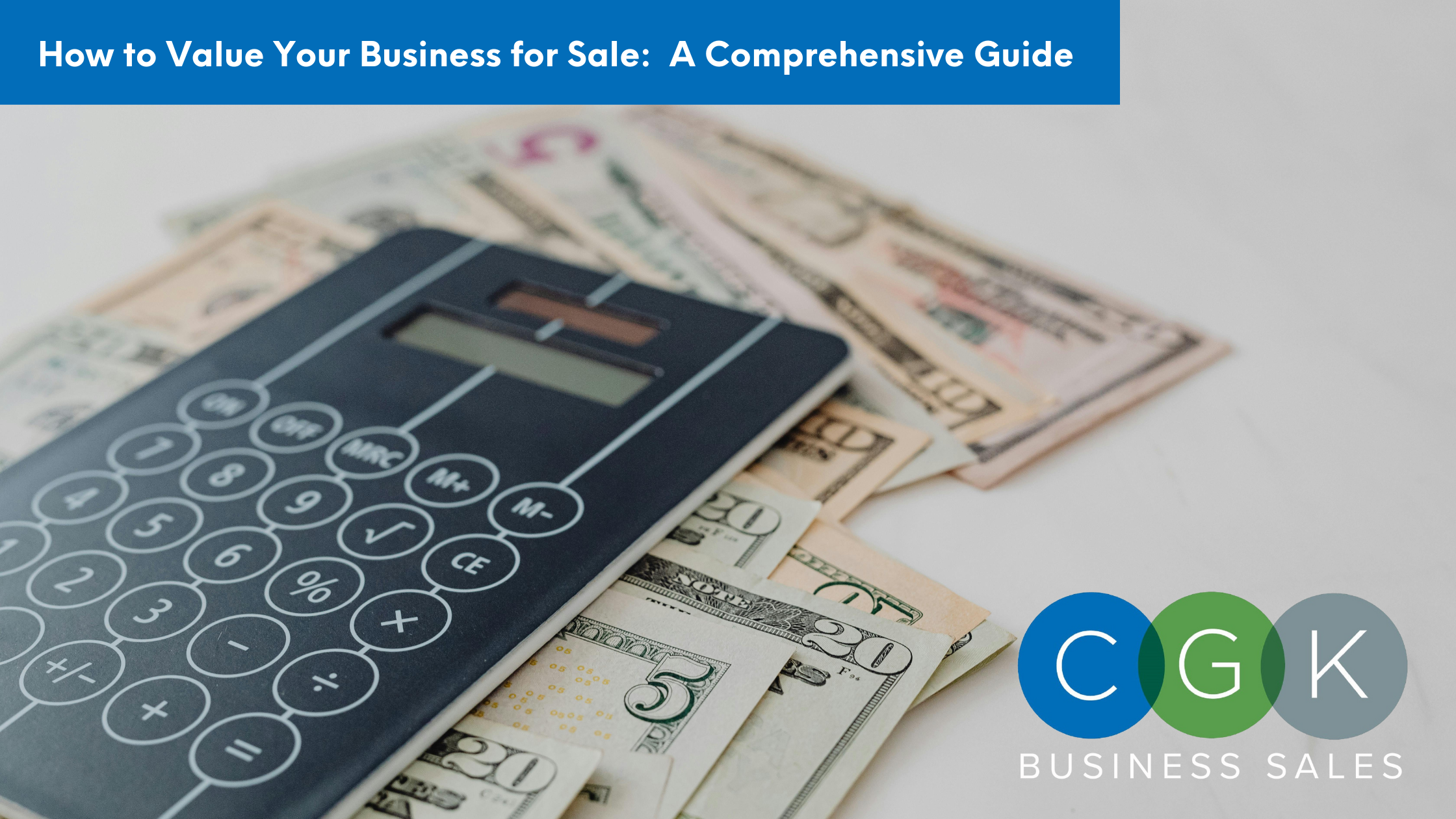Frequently Asked Questions
Are there any upfront fees for you to sell my business?
No. We are only paid if the business sells. Hence, we are picky about the types of businesses and business owners that we work with, as we have a proven process. We have a 90%+ closing ratio.
How long will it take for you to sell my business?
While it’s impossible to know exactly how long it will take, it typically takes about 3 months to find the right buyer and 2 – 3 months of due diligence, legal, banking, etc. to close the deal. This can be shorter or longer depending on your selling price expectations, how “in-demand” the business is, location (near a major metropolitan area or on the outskirts), how quickly you can get us access to information, how much cash flow the business produces, and how complicated the deal is. We’ve found buyers within a day or it could take up to a year, depending on many factors. However, we always find a buyer. This is a market, though, so how much a buyer is willing to pay for your business is subjective. All that we can guarantee is that we position your business for the best price and terms through our proven, proprietary process. Our process usually produces multiple buyers. We sell 90%+ of the businesses that our sellers entrust us to sell.
Have you sold a business exactly like mine?
While no business is exactly the same, we have sold businesses in every industry. In cases where we have not sold your exact type of business, we’ve probably sold something similar. Since we always find buyers, the important part of this process is not whether we have some “special” buyer for your business, but whether we can get you a great price, great terms, and get the deal to close. “Having a buyer” is less important than you probably think. This isn’t real estate. While you, of course, need a buyer to close a transaction, we always find a buyer. How you run your process is much more important. This is where we shine. This is a complicated process, with lots of moving parts. We’re experts at this. We’ve done this many, many times. We’ve sold very niche and very complicated businesses and have often dealt with the unexpected. Our business brokers / M&A advisors are not typical at this level of the market. They have great backgrounds. Remember, there is a big difference between finding a buyer (or having your own) and actually getting a deal closed. There is structuring, due diligence, banking, legal, taxes, and third-party valuations. Any of these parts can quickly derail your deal. Even if your buyer isn’t an expert, their service providers probably will be. We find that we pay for ourselves, or more, in some aspect of this process. We get your deal done and get you paid. Less than 20% of privately held businesses sell. We sell 90%+. Enough said…
How much is my business worth?
While there are some rules of thumb (and lots of bad information on the internet), most “Main Street” businesses and lower-middle market businesses sell for a multiple of the cash flow of the business. This is not your net income. There are adjustments that are made to the net to better reflect what the new owner, company, or private equity firm would make, if they bought your business. These adjustments need to be within reason. Please don’t tell us that if Big Company “A” buys your small or medium-sized business, they will have zero operating expenses. For Main Street companies, typically, those worth less than $5 million, businesses sell for a 1 -4 multiple of SDE (Seller’s Discretionary Earnings). For lower-middle market and middle market businesses, this can be a 2 – 8 multiple of “adjusted” EBITDA (Earnings Before Interest, Taxes, Depreciation, and Amortization). Obviously, these are wide ranges. Hence the need for a business valuation. Don’t just pick the top multiple in the previous sentence. Just for some perspective, typical EBITDA multiples on Wall St are 11, absent bear or bull market extremes.
However, to narrow business valuation down to a simple multiple would be an insult to business valuations. This is why we spent 2 years in business school and 3 years completing the CFA (Chartered Financial Analyst) program. Business valuations are a complex and fickle beast. This is why stocks are so volatile. The future is hard to predict. We will walk you through our “three-legged stool”. This is how valuations at the Main Street and lower-middle markets are based. This usually gives sellers confidence that a) we know what we’re doing and b) lifts some of the fog about how businesses are valued. We are happy to present this information to you, so you can see it for yourself.
There are many factors at play. One of the worst mistakes we see business brokers and some M&A advisors make is making way too many adjustments, commonly known as add-backs. Most likely, the buyer, the bank, or the third-party valuation company won’t accept most of those adjustments. This throws the seller’s expectations completely off, killing the deal. We know what adjustments are acceptable and which are not. Unfortunately, many business brokers will use these adjustments, that they know won’t work, to try to get you to sign up with them. Meanwhile, they know the price they tell you it’s “worth” will never happen. Please know that we are not miracle workers. If you’ve spent a lot of effort hiding cash or putting too many personal expenses into your business tax returns, you’re only hurting yourself when it comes time to sell your business.
Finally, we know your “friend” or “cousin” sold their business for 3X – 10X revenues, but this only happens in the rarest of cases. These are companies typically involved in technology, Silicon Valley, or venture capital-backed companies. These are “disruptive” companies that change industries and eventually have billions in revenue, and possibly, billions in earnings, like a Tesla or Uber. Is that your company?
How much do you charge to sell a business?
This is completely dependent on the size of the business. We charge the standard commission that most business brokers or M&A advisors (for larger deals) would charge. Since our fee is a “success fee”, the more you get for your business, the more we’re paid, as well. This keeps us aligned. Call or email us for more details.
Who is going to buy my business? I can’t imagine it won’t be a competitor of mine?
This is what most business owners think. The truth is, we don’t know if your buyer is going to be another company, a private equity firm, or a high-net worth individual. In our experience, strategic buyers (these are what companies in your industry are called) below the $5 million value level are cheap. Meaning, unless they have previous M&A experience and understand the value of acquiring a business, and the resulting synergies, they won’t be highest bidder or give you the best terms. When we find a company who understands M&A, great. This is the best buyer for your business. We can slide them right into your seat. Otherwise, companies tend to be cheap. They would rather spend hundreds of thousands on marketing or hiring salespeople, than spend the millions it might take to buy your business. This changes, a bit, above the $5 million level. High-net worth individuals tend to fall off and the buyers become predominately private equity firms and strategic buyers (companies). For these lower middle-market and middle market sellers, we run personalized campaigns to find the RIGHT company or PE buyer to buy your company. This is not easy.
At CGK, since we don’t know exactly who is going to buy your business, we create marketing materials that attract lots of different types of buyers. Different types of buyers want different things. Sellers have to be prepared to answer certain questions in certain ways, depending on who the buyer is. Otherwise, it might kill your deal. We coach you to answer these questions. While we certainly do not want you to be deceptive in your answers (this will kill your deal), as mentioned, different buyers have different motivations to buy your business. It’s important to highlight these differences. Your answers will probably be different than you think.
Finally, if your company is worth less than $5 million, please don’t think Big Public Company “A” is going to buy your business and pay you any amount to do so. You’re likely going to be disappointed. Big Public Company “A” is primarily concerned with bigger deals that will move the needle. It’s hard to get a public company to pay attention to your small business with a few million in revenue. Plus, they’re probably not going to pay you what you think. Remember, Big Public Company “A” often has an internal deal team. These are former investment bankers who know how to value a business. However, if you’ve got revenue of $20 million+ and you’re growing at 50%+ per year, that might be a different story.
I don’t want everyone to know that I’m selling my business, especially my employees or competitors? How do we keep this quiet?
Great question. We know this is extremely important. Our process is very confidential. We’ve been very successful keeping these deals under wraps. Everyone signs an NDA (non-disclosure agreement) before we give out any information on the business. Except for public companies and private equity firms with known, committed capital, we also ask for a buyer profile. This tells us who they are, where they work/live, and the types of funds they have.
As far as your employees, we agree that this should not become known, especially to the rank and file. We have meetings with buyers at the business, outside of business hours or on weekends. Many times, the employees will not know the business is being sold until the deal closes and you announce the deal. Since there is always a transition period, this will give you and the new owner time to let the employees know that their jobs are safe. You can also get them excited because better opportunities may lie ahead, as the new owner will want to grow his way out of the debt, leading to bigger and better responsibilities for current employees. This might mean more money for them, as well. In some cases, where there are “key” employees, the buyer may insist that they speak with these types of employees before the deal closes. This usually happens near the closing, after all other due diligence is completed, financing is secured, and legal is basically complete. For most small businesses, this is rare. “Key” employees are usually making six figures, have an outsized impact on revenue, and are not easily replaceable. This is not a manager at a Subway, unless they’re running twenty of them for you.
I’m not ready to sell my business. Will you give me a business valuation?
Yes, of course. We love doing this. This is a common part of an exit strategy. Let’s face it. Most sellers come to us with their hair on fire, needing to sell their business immediately, for one reason or another. Since these businesses are rarely properly positioned to be attractive to buyers, we love when folks come to us 3 to 5 years out (or more) to find out how their business is valued. This gives them plenty of time to change what needs to be changed. Buyers don’t like to see huge changes right before a business is sold. Time is an important element. In addition to the obvious quantitative factors, this gives sellers plenty of time to work on the qualitative factors that buyers want to see in an attractive business. We will value your business for a modest fee and go over those qualitative factors that will best position your business for success when it’s time to sell. This will likely add hundreds of thousands of dollars to your business’s value, at worst, if not millions. We have many happy customers who’ve been pleased with this service. Who knows? If we like your business enough, we might invest and get you where you want to be in a more direct fashion.
What size businesses do you usually work with?
$1 million to $50 million in revenue. We’ve also worked with much larger businesses than $50 million in revenue in the past, at different stops in our careers, but this seems to be the most common revenue amounts that we come across at CGK.
Will you help me buy a business?
To be quite honest, this depends. For individual buyers, we only do “searches” in very rare instances. Instead, it’s better if you think a bit about what kind of business that you want, before you contact us. While you may be open to many different kinds of businesses, it’s a wide, wide world out there and we don’t know what’s best for you. Start by looking at BizBuySell. We would recommend you stay away from anything on the front page: laundromats, dry cleaners, car washes, convenience stores, etc. Begin with your previous business experience as a guide. To make the kind of money you’re probably going to want to make, you’re probably going to need or want financing. This allows you to buy a bigger business that produces more cash flow. A bank will want you to have some industry experience or at least previous experience running a business before they give you a loan. This is an SBA mandate for deals below $5 million in loan value. The SBA will back almost any bank you’re going to talk to because they guarantee the loans to the tune of 75% for the bank. Your experience can be somewhat fungible, depending on the type of funds you have. Meaning, the more personal capital you have to collateralize the loan, the less direct experience you will likely need in that type of business. However, the less capital, the more direct experience you’re going to need. By the way, while some seller financing is usually available to some degree, when you buy a business, this does not mean the seller is going to finance 80%-90% of the deal and you can skip the bank. Seller financing is usually 0% to 30% of the purchase price. The more “in-demand” the business is, the less the seller will have to finance. Simple as that. Leave the “no money down” to the late-night infomercials for real estate. This is not that. I’d be worried about adverse selection in a situation where an owner, who could get 70%+ up front, allows you to only put down 10%-20% to buy his or her business. That business is probably in trouble.
Here’s what we do for individual buyers: While you will have to pay for a full, complete, third-party business valuation as part of the SBA financing process, this will not happen until the deal is about to close. So how much should you offer on a business that you found? That’s where we can help. We’ll value the business up front, so you know what a good or bad offer will look like. We are aware that you’ll be paying for this twice, so our fees are reasonable.
In the rarest of cases, we will back an industry executive who knows exactly what type of business they want to buy and we will become his or her miniature private equity arm. You will operate or oversee the businesses while we will hunt for deals and find the capital for those deals. Contact us for more details.
Finally, if you are a business, we will do a search for one of your competitors or a business within your supply chain, to buy. We have successfully done this in the past and these are the only types of “searches” we do, unless we’re involved in a private equity fashion via above. Please contact us for more details.
Why should I pick CGK versus the other business brokers / M&A advisors?
Great question. Unfortunately, the business brokers and M&A advisors helping small to medium-sized businesses in this country are not very good. They’ve never been trained properly. While their resumes may sound impressive to the uninitiated, there’s a massive difference for those that truly know how sell-side M&A is done. Most business brokers in this country are former business owners, who, once they sell their business, decide that they want to become business brokers. While we have the utmost respect for the entrepreneurs in this country, this is not a good background for M&A. We say this because we get complaints from buyers about business brokers who “don’t know what they’re doing”, all the time. While they may understand some aspects of accounting and finance from running a business, you need someone who knows this process inside and out. Others will have more impressive resumes from public companies who bought other companies, or buy-side M&A. Legal or CPA’s are the other usual suspects. None of these folks have the total training that is involved in sell-side M&A.
Here’s an example. In some aspects, the accounting and finance at this level is more difficult that public companies. It’s the Wild West. We are not dealing with audited financials. We often have to take a deep dive into the financials to understand what the problems are. Finance is just one aspect. What makes this difficult is knowing the combination of accounting, finance, legal, due diligence, and banking. If you don’t know a decent amount about all of these, your deal is likely to fail. Here’s why: Sometimes, it’s the smallest detail that can make a deal go south. You never know where this aspect will rear its ugly head. Legal is a great example. Each opposing attorney is trying to get the best deal for their client. Let’s face it, by creating arguments, this creates billable hours for the attorneys. Since the buyer and seller don’t know anything about law, they take their attorney’s word to the grave. Often, this results in a stalemate and it’s thrown back into our lap, where both sides need to make a “business decision”, as to what they will accept. While we are not attorneys, having some functional knowledge of the situation could be the difference between the deal dying or closing. This same situation can play out in accounting, banking, or with the third-party business valuation. This is why you need good representation and why we get so many of our deals closed at CGK. Otherwise, the numbers speak for themselves. Less than 20% of privately-held businesses sell. We close 90%+. Don’t settle for second-best. This will probably be one of the most important financial decisions of your life. Can you trust this to anyone else?
What They’re Saying
OUR TEAM
DavidSmoot
ManagingDirector
David Smoot has 20 successful years working for Fortune 500 companies in sales and finance and owning his own small businesses. His leadership roles included sales, finance, managing multi-million dollar product launches, training new ... (click David's picture to read more)
Confidential. Contact. Conversation.
Let's get started.
The experts at CGK Business Sales are ready to talk to you about mergers & acquisitions and business brokers’ role in the process. And it’s always 100% confidential.
While we certainly love when you call, as you can imagine, we spend the majority of our day on the phone, closing deals, so we love it even more when you use this form to email us! We will get back to you as quickly as possible! Seriously! This form only goes to Greg’s email (CGK’s owner), so it’s completely confidential!
Our unique selling process is tailored for businesses with at least $2 million in revenue (up to $100 million) and $500,000 to $10,000,000 in owner’s profit.
Austin Office:
2720 Bee Caves Road
Austin, TX 78746
(512) 900-5960
San Antonio Office:
700 N Saint Mary's St
San Antonio, TX 78205
(210) 526-0094
Houston Office:
1200 Smith St
Houston, TX 77002
(713) 588-0240
Dallas Office:
325 N Saint Paul St
Dallas, TX 75201
(469) 998-1968
Phoenix Office:
40 N Central Ave
Phoenix, AZ 85004
(602) 714-7470
Colorado Springs Office:
102 S Tejon St
Colorado Springs, CO 80903
(719) 471-0115
Denver Office:
1600 Broadway
Denver, CO 80202
(303) 974-7978
Nashville Office:
424 Church St
Nashville, TN 37219
(615) 800-7118
Louisville Office:
312 S 4th St
Louisville, KY 40202
(502) 287-0332
Baltimore Office:
111 S Calvert St
Baltimore, MD 21202
(410) 777-5759
Washington DC Office:
1050 Connecticut Ave NW
Washington, DC 20036
(202) 888-6120
























